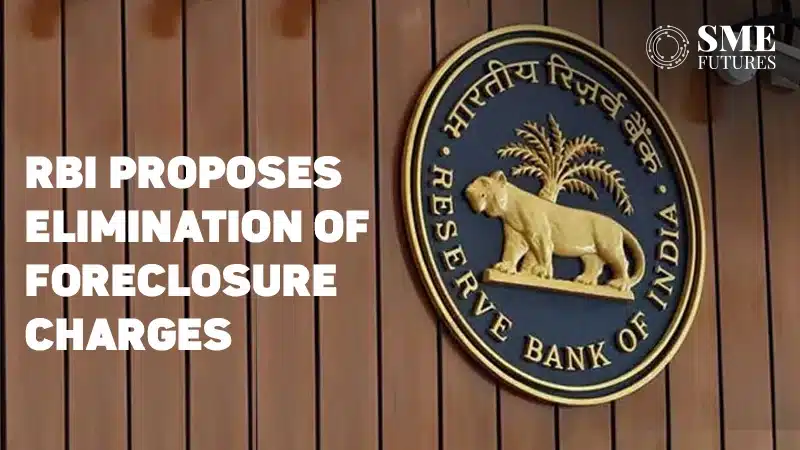In a significant step toward promoting responsible lending and easing the financial burden on small businesses, Reserve Bank of India (RBI) Governor Shaktikanta Das announced a proposal to eliminate foreclosure charges on loans taken by Micro and Small Enterprises (MSEs). Speaking during the recent Monetary Policy announcement, Das emphasised the need to align MSE loans with individual loans, which do not attract foreclosure penalties.
The move comes as a relief for the Indian MSE sector, a backbone of the country’s economy, which has long been grappling with high-interest costs and limited access to flexible credit. While the RBI has floated the idea for public consultation, the industry is urging swift implementation to unlock its full potential.
What are foreclosure charges, and why do they matter?
Foreclosure charges, also known as pre-payment penalties, are fees imposed by banks or financial institutions on borrowers who choose to repay their loans before the scheduled tenure ends. These penalties are meant to compensate lenders for the potential loss of interest income.
Currently, foreclosure charges do not apply to individual borrowers who take floating-rate loans for non-business purposes. However, MSEs, despite their crucial role in economic growth, are still subject to these penalties. This often discourages small businesses from repaying loans early, limiting their ability to reduce interest burdens when they have surplus cash.
RBI’s proposal: Positive shift for MSEs
The RBI Governor’s announcement proposes to broaden the scope of the existing foreclosure guidelines to include loans extended to MSEs. This will align MSE loans with personal loans in terms of prepayment flexibility, helping small businesses avoid penalties and manage their debt more efficiently.
In his announcement, Governor Das emphasised the importance of responsible lending practices and stated:
“Banks and NBFCs are not permitted to levy foreclosure charges on floating rate loans sanctioned to individual borrowers for purposes other than business. It is now proposed to extend this policy to MSE loans as well. A draft circular will soon be issued for public consultation.”
Industry reaction: A step in the right direction
The Federation of Indian Micro and Small & Medium Enterprises (FISME), one of the leading advocacy bodies for MSMEs, has welcomed the RBI’s proposal but expressed reservations about the delay in implementation.
In its response, FISME stated:
“We welcome RBI Governor’s announcement that it is proposed to do away with foreclosure charges for Micro and Small Enterprises (MSEs) also. However, we could not understand why even this proposed policy is being put for public discussion. RBI should have issued the circular right away.”
This sentiment reflects the urgency felt within the industry to remove financial barriers that hinder small businesses from optimising their cash flows and debt management.
How the move will benefit Indian MSEs
- Reduced Financial Burden:
Eliminating foreclosure charges will enable MSEs to repay loans early without incurring penalties. This will encourage businesses to manage cash flows more efficiently and reduce interest costs over time. - Improved Credit Flexibility:
The ability to prepay loans without penalties provides financial flexibility. Businesses can reduce their debt burden during profitable periods, helping them reinvest in growth. - Lower Risk of Debt Trap:
In times of economic uncertainty, such as inflation or market slowdowns, MSEs often struggle with high-interest loans. Allowing prepayment without penalty can help them avoid accumulating excessive debt and prevent financial distress. - Encourages Responsible Borrowing:
The removal of foreclosure charges incentivises MSEs to borrow responsibly and pay off loans when possible, promoting healthier credit practices in the sector. - Boosts Business Confidence:
With fewer financial restrictions, small businesses are more likely to take on growth-oriented projects and invest in new opportunities, driving innovation and economic activity.
The path ahead: Addressing industry expectations
While the proposal has been widely welcomed, industry leaders are pushing for swift implementation. The public consultation process may delay the policy rollout, raising concerns among business owners who are eager to benefit from the change.
“Given the current economic challenges, including inflation and slow growth, immediate action on the RBI’s part could provide much-needed relief for the MSE sector,” said an industry expert.
Many believe that early implementation of the policy would signal strong regulatory support for small businesses, especially as they navigate economic recovery.
Timely initiative for a growing sector
MSEs constitute a vital component of India’s economy, accounting for over 20 per cent of the MSME sector and playing a crucial role in job creation and exports. With easier access to credit and reduced financial constraints, the sector can contribute even more significantly to economic growth and employment generation.
As the policy evolves, banks and NBFCs will also need to align their lending strategies with these changes, offering more borrower-friendly terms and flexible repayment options. This will further strengthen trust between financial institutions and borrowers, creating a more inclusive financial ecosystem.
Step towards financial empowerment
The RBI’s proposal to eliminate foreclosure charges on loans for Micro and Small Enterprises (MSEs) represents a significant milestone in promoting responsible lending and enhancing financial empowerment. By granting businesses the freedom to manage their debt efficiently, this move is set to foster a more resilient and competitive MSE sector in India.
While the public consultation process may delay immediate relief, the industry’s response indicates strong support for the policy. If implemented promptly, the removal of foreclosure charges could usher in a new era of financial flexibility and growth for Indian entrepreneurs, strengthening the backbone of the economy.
This development highlights the RBI’s commitment to addressing the needs of the MSE sector and aligning its policies with the evolving economic landscape—creating a win-win scenario for both businesses and lenders.











